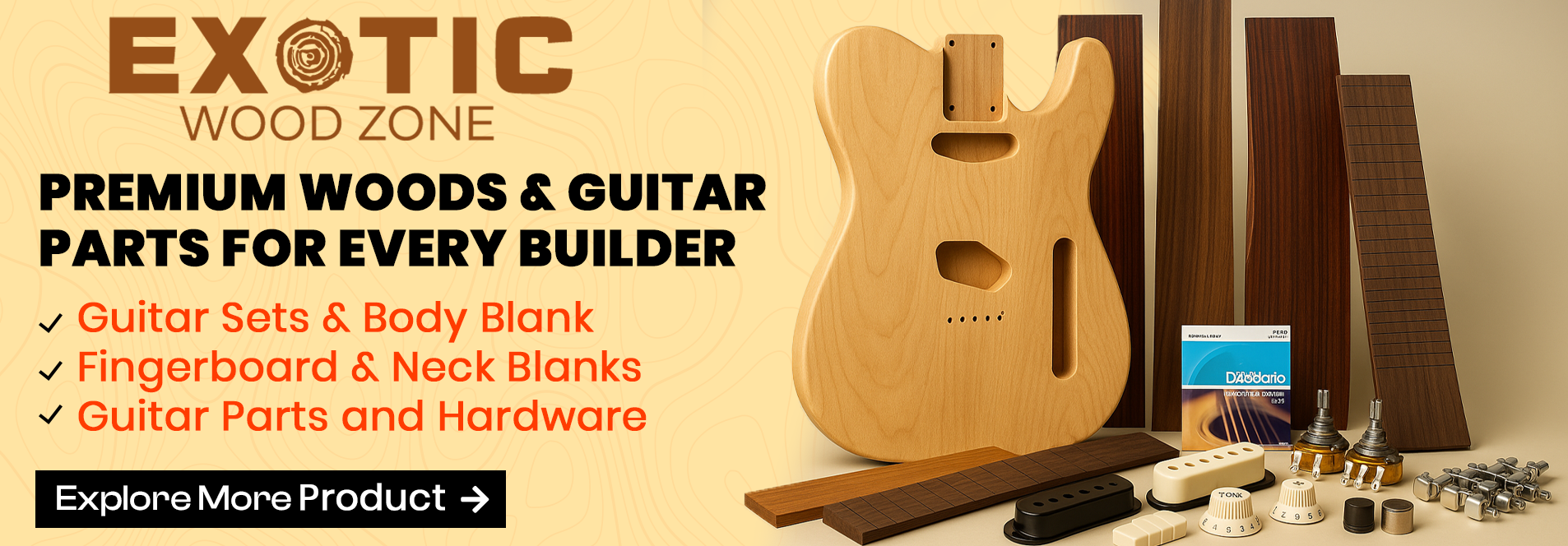Starting to do my first bound fretboard. I like the look of an ebony fretboard with ebony binding and a veneer purfling layer sandwiched in between. The purfling I would like to use is a died Koto wood veneer. Koto has a Janka hardness number of 940 which is relatively soft. As a comparison, hard maple is 1450 and ebony is something like 3100. My question is.... do I need to worry about the durability of the purfling strip on a fretboard? The purfling is about 2 mm from the edge of the fret board and the strings ( high and low E ) are only about 1/8 or 3 mm. The purfling is about .02 inches thick and the high E string is about .01 inches in diameter. Seems like you could see substantial wear on the purfling. I was thinking you could soak the purfling strip in CA glue and then sand it down flush again to make it more durable. Anybody out there have an opinion??
Thanks
Bound Fretboard Question
-
scamp
- Posts: 411
- Joined: Sat Mar 26, 2022 8:19 pm
-
TEETERFAN
- Posts: 438
- Joined: Fri Sep 07, 2018 12:43 pm
- Location: Kansas City, MO
Re: Bound Fretboard Question
That seems like a good strategy, at least to me. You could have to reapply some CA if you have to level sand after your glue up.
Kevin Doty
Kansas City
Kansas City
-
Kevin Sjostrand
- Posts: 4076
- Joined: Sat Feb 09, 2008 8:06 pm
- Location: Visalia, CA
Re: Bound Fretboard Question
Interesting question. I've never even thought about the hardness of the purfling material.
I've used the typical fiber and dyed wood purflings on my fretboard and as far as I know this has never been a problem
The wood purflings are generally dyed and natural maple but the fiber, well it's fiber of some sort and is not particularly hard.
What I always for with an ebony board is cut a strip off both sides which become the binding. Glued back on and you can't tell that it's not solid. Thin maple strips make a beautiful contrast purfling here.
Personally I don't think you need to worry about it as long as it's not cardboard. 😁
I've used the typical fiber and dyed wood purflings on my fretboard and as far as I know this has never been a problem
The wood purflings are generally dyed and natural maple but the fiber, well it's fiber of some sort and is not particularly hard.
What I always for with an ebony board is cut a strip off both sides which become the binding. Glued back on and you can't tell that it's not solid. Thin maple strips make a beautiful contrast purfling here.
Personally I don't think you need to worry about it as long as it's not cardboard. 😁
-
tippie53
- Posts: 7174
- Joined: Fri Mar 03, 2006 7:09 pm
- Location: Hegins, Pa
- Contact:
Re: Bound Fretboard Question
your plan will be fine, I do suggest you seal the neck as the CA can stain the neck if you get any spilled
John Hall
Blues Creek Guitars Inc
Authorized CF Martin Repair Center
president of Association of Stringed Instrument Artisans
http://www.bluescreekguitars.com
Blues Creek Guitars Inc
Authorized CF Martin Repair Center
president of Association of Stringed Instrument Artisans
http://www.bluescreekguitars.com
-
scamp
- Posts: 411
- Joined: Sat Mar 26, 2022 8:19 pm
Re: Bound Fretboard Question
Thanks a lot guys. It is interesting to me that no one really talks about it. They talk about how important it is to use hardwoods for the fretboard for durability but I can’t find any info on the purfling on bound boards which is essentially right under two of the strings. I suspect it never is really a problem because whatever glue is used adds significant hardness to a 0.02 inch thick veneer ( even fiber ). Again… thanks for your thoughts on this.
-
scamp
- Posts: 411
- Joined: Sat Mar 26, 2022 8:19 pm
Re: Bound Fretboard Question
Thanks a lot guys. It is interesting to me that no one really talks about it. They talk about how important it is to use hardwoods for the fretboard for durability but I can’t find any info on the purfling on bound boards which is essentially right under two of the strings. I suspect it never is really a problem because whatever glue is used adds significant hardness to a 0.02 inch thick veneer ( even fiber ). Again… thanks for your thoughts on this.

